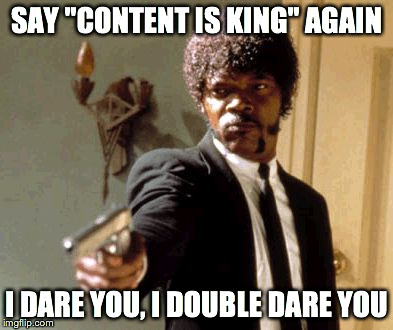When I started SEO back in 2005, the rule of thumb was loud and clear:
CONTENT IS KING

I’m not exactly sure what is the origin of that phrase and never questioned it because it just makes sense. It is a constant reminder that no matter the number of backlinks, the page speed, the brand, etc. the content prevails.
Content is King means much more than “write quality content“
Content quality is the ultimate measure of success.
Because Google ranks pages, it quickly became the primary KPI for content quality with an unfortunate consequence: Editors had to share the responsibility of the content quality with SEOs, who are now Google’s evangelists messengers of their quality guidelines: In the name of Google, SEOs interpret Google’s guidelines, reverse engineer the algorithm, and relentlessly try to come up with golden rules to game the system.
Made-up (or are they?) examples for a post
- 1,000 characters minimum! because Google likes content
- Use those exact words X times because the competition does or TF-IDF
- Must have 1 external link and 3 internal links because Pagerank, Cheirank *rolling eyes*
- Nofollow external links and !!!Don’t link to competitors!!! because we don’t give away Pagerank
- Needs to be updated daily just to bump the publishing date for freshness
- Change the URL and redirect the page (aka the less secret trick that might have worked 50% of time for 6 months…)
- H2 EVERYTHING, so Google will make us rank higher on those terms too! haha stupid Google
- etc.

and it worked! Google is just a stupid robot after all.
The only problem now is:
Google is not (such) a stupid robot anymore. They rely increasingly on Artificial Intelligence and Natural Language Processing which makes the algo infinitely harder to trick.
Another issue I realized recently:
Editors are scared of Google. I’ve been working with big publishers over the past years, with incredibly talented writers and editors that are asking me to sign-off content on topics they have unmatched expertise. Imagine Van Gogh asking you if his doodling is ok?
So, Google is smarter about content quality and better at identifying smarty-pants SEO tricks. That sounds to me like now is a good time to:
Give back the responsibility to editors and writers.
Concretely, it means that in a content strategy, instead of trying to build constraints, SEOs should help editors to:
- Prioritize (creation and update) based on content opportunities (search volume, seasonality, revenue opportunity etc.)
- Train writers on SEO guidelines (and not SEO interpretations or tricks: number of words, internal links, update cadence etc.)
- Identify Opportunities and adjacent topics
- Define content clusters to optimize the internal linking
- etc.
And trust the process: if you hired the right person to write content within their domain of expertise:
- They will use the right keywords the right number of times regardless of your TF-IDF calculation
- The article will have the right length because it won’t start with “what is an iPhone” intro on the “iPhone 14 review” page followed by 14 FAQs
- They will link to internal articles that make sense because they know their section
- They will link to important external resources (even competitors) if that’s helpful information
And as SEO, your input to optimize will be more than welcome. Editors edit, SEOs optimize and success relies on the quality of your collaboration.

Some tools I use to collaborate
- Favor guardrails over guidelines, and allow a margin of flexibility e.g. it’s ok if your title has two extra characters if the 60 first ones make sense
- Please provide a list of URLs to the people responsible for updating them. It sounds so obvious that I never see it happening
- Share (even basic) performance data so you share that responsibility
- Use the performance + list of URLs to define clear action items: e.g.
- not ranking + out of date = update,
- not ranking + updated = potential issue,
- has a previous year in the title = queue for an update,
- hasn’t been updated in a year + low traffic = update if relevant or kill / redirect
- etc.
For my reports, I leverage the following:
- Days Since the last update
- Traffic variation
- Ranking variation (! can be defined in a lot of ways)
Read Next:
Was this helpful?
0 / 0

SEO/Data Enthusiast: 10+ years of experience in the Internet industry, technical background, and robust analytics mindset.
I help international organizations and large-scale websites to grow intent-driven audiences on transactional content and to develop performance-based strategies.
Currently @ZiffDavis – Lifehacker
ex @DotdashMeredith, @FuturePLC